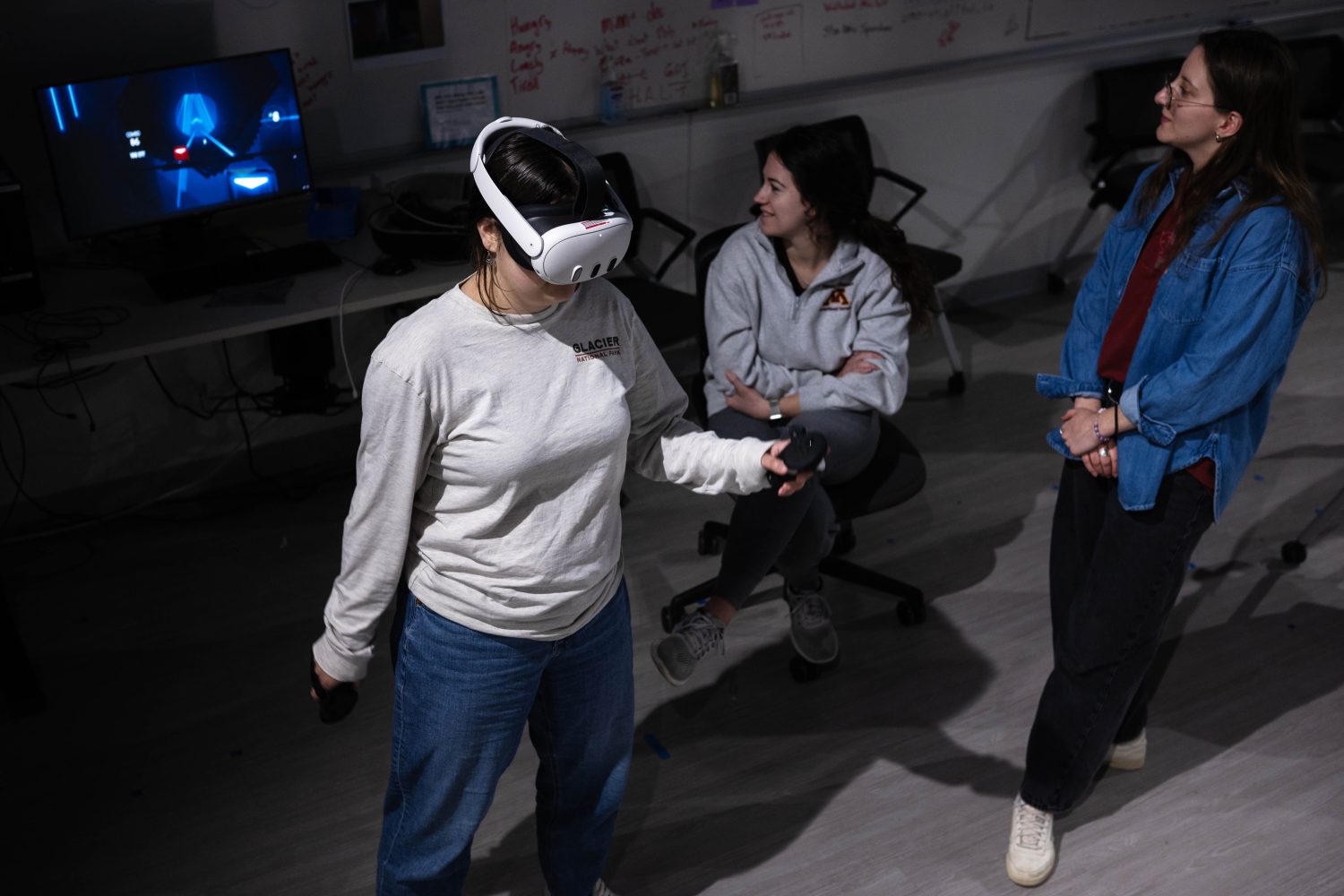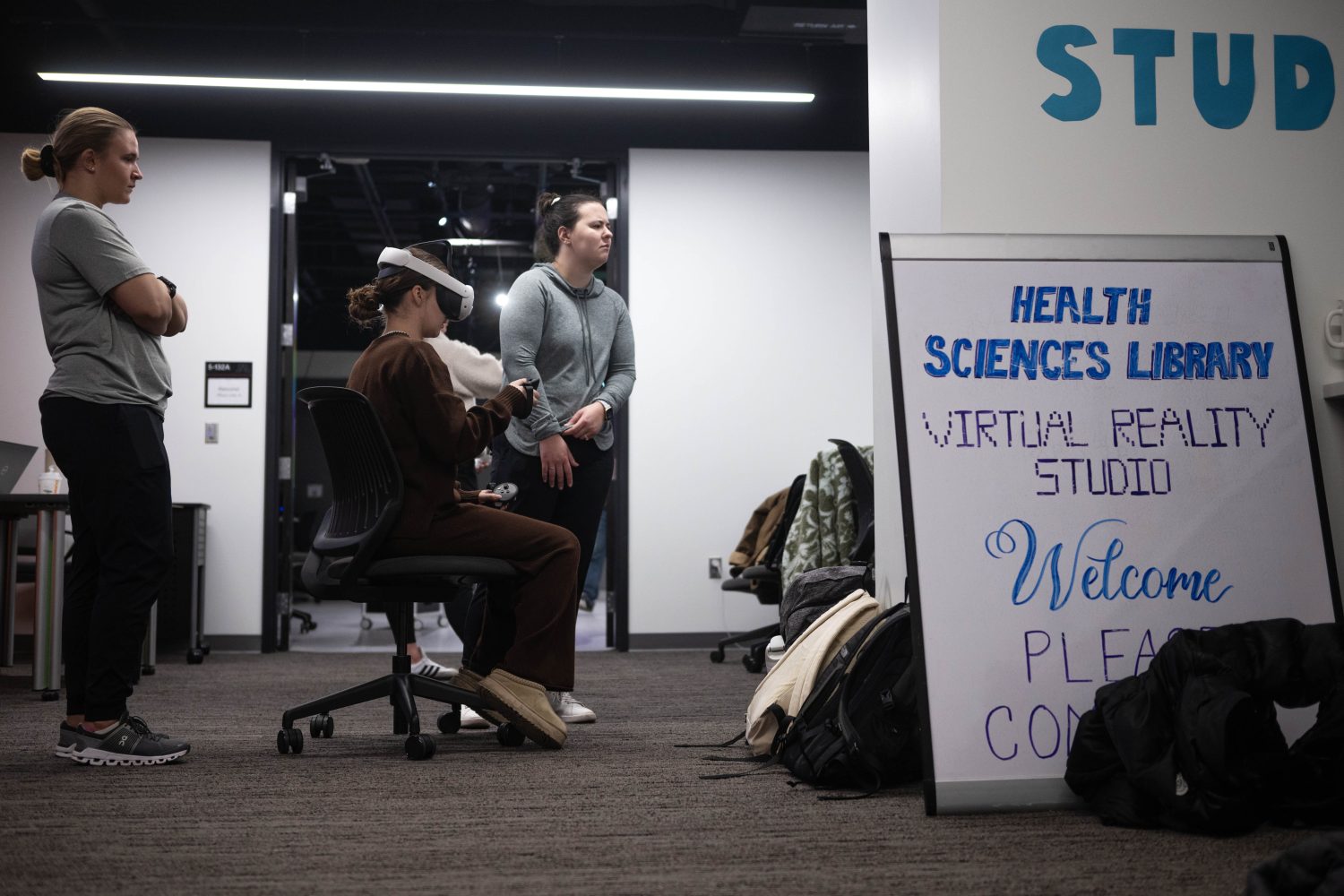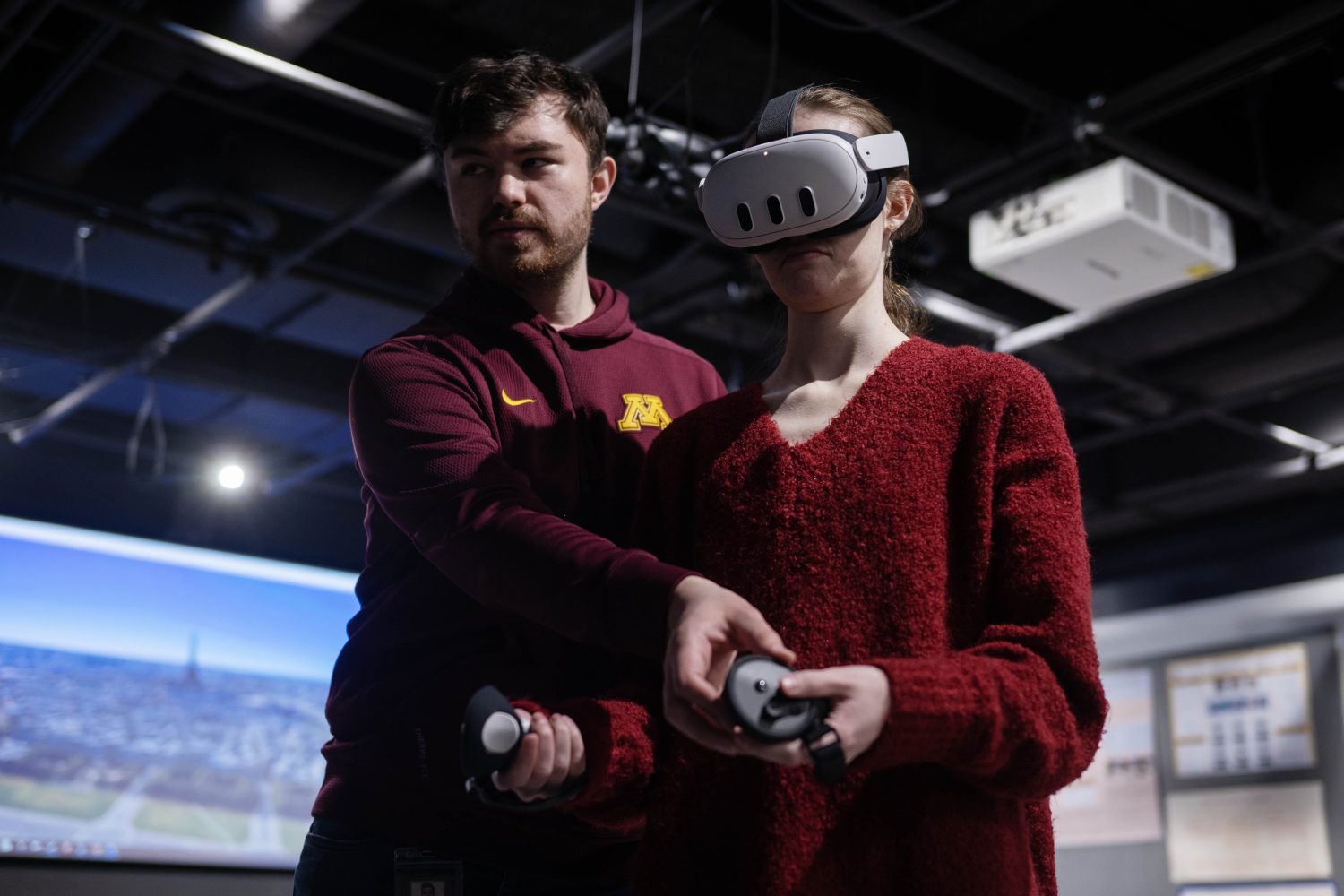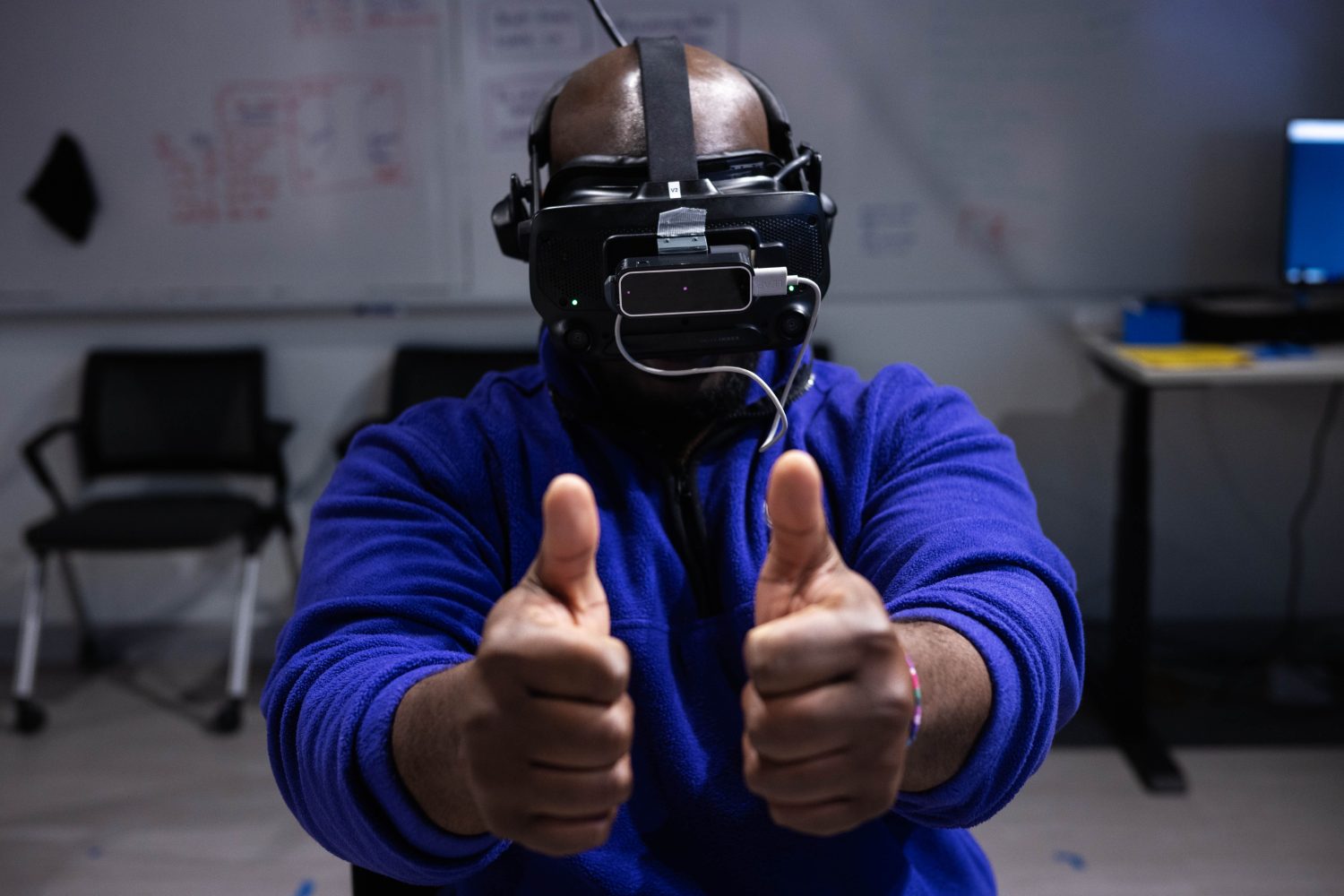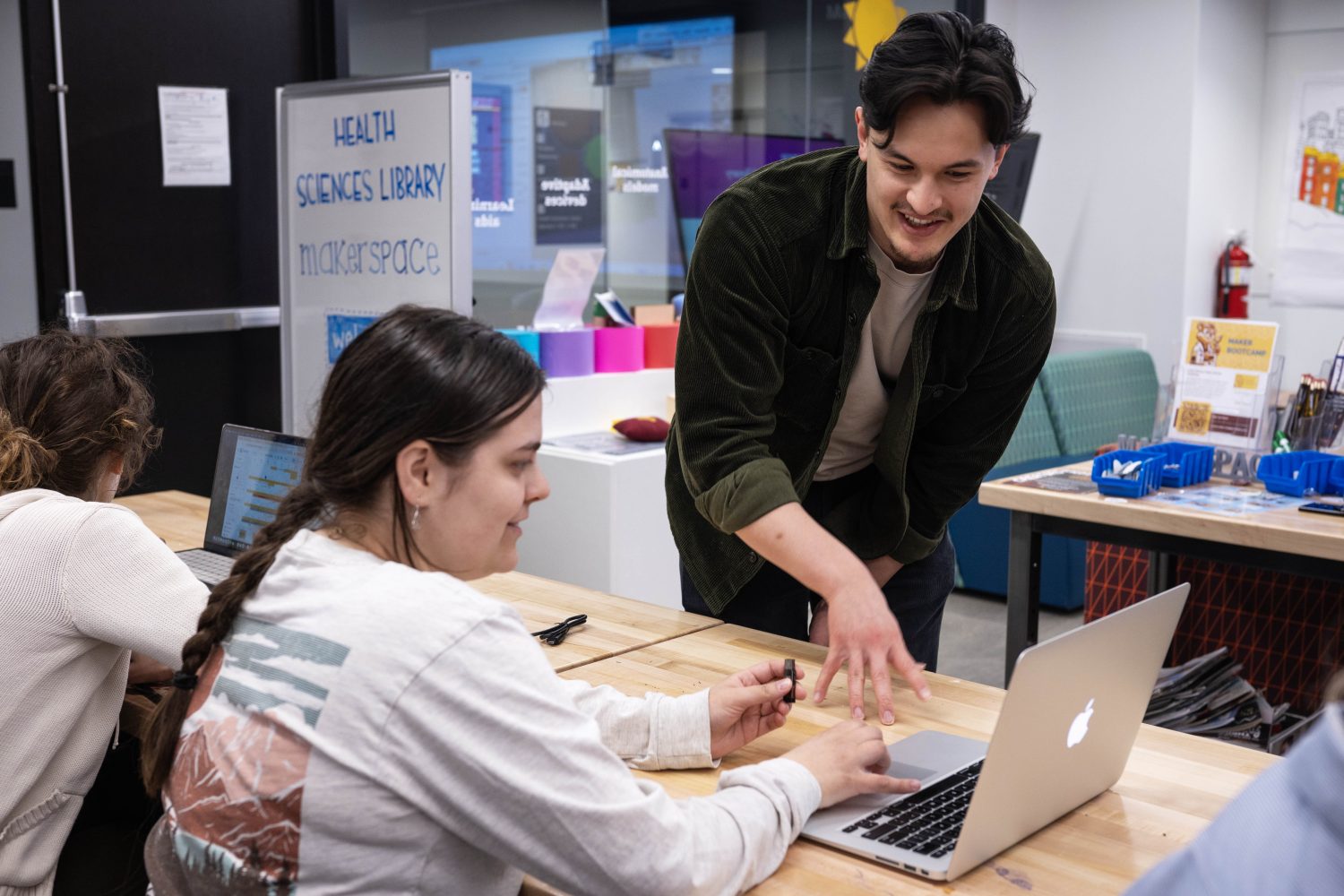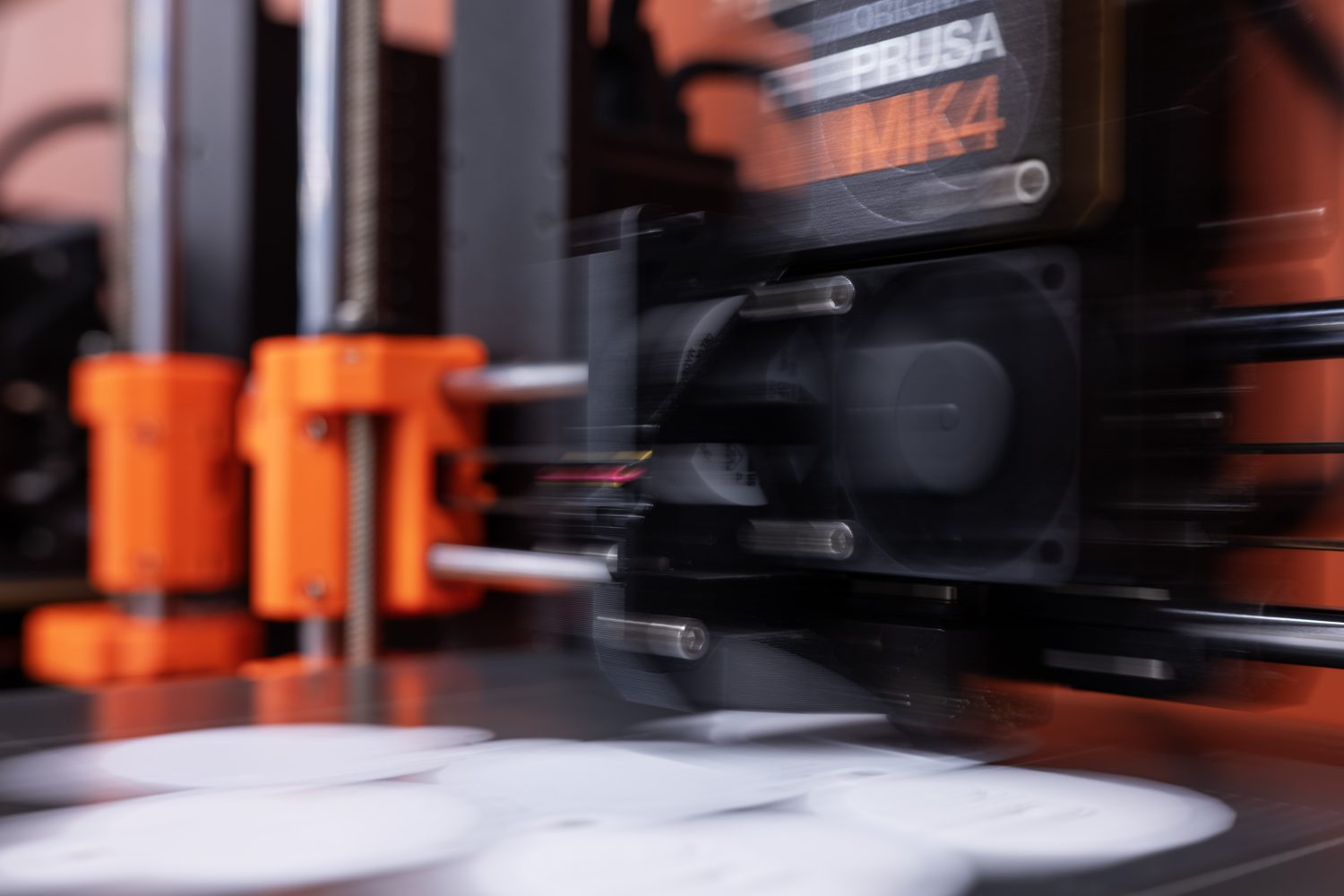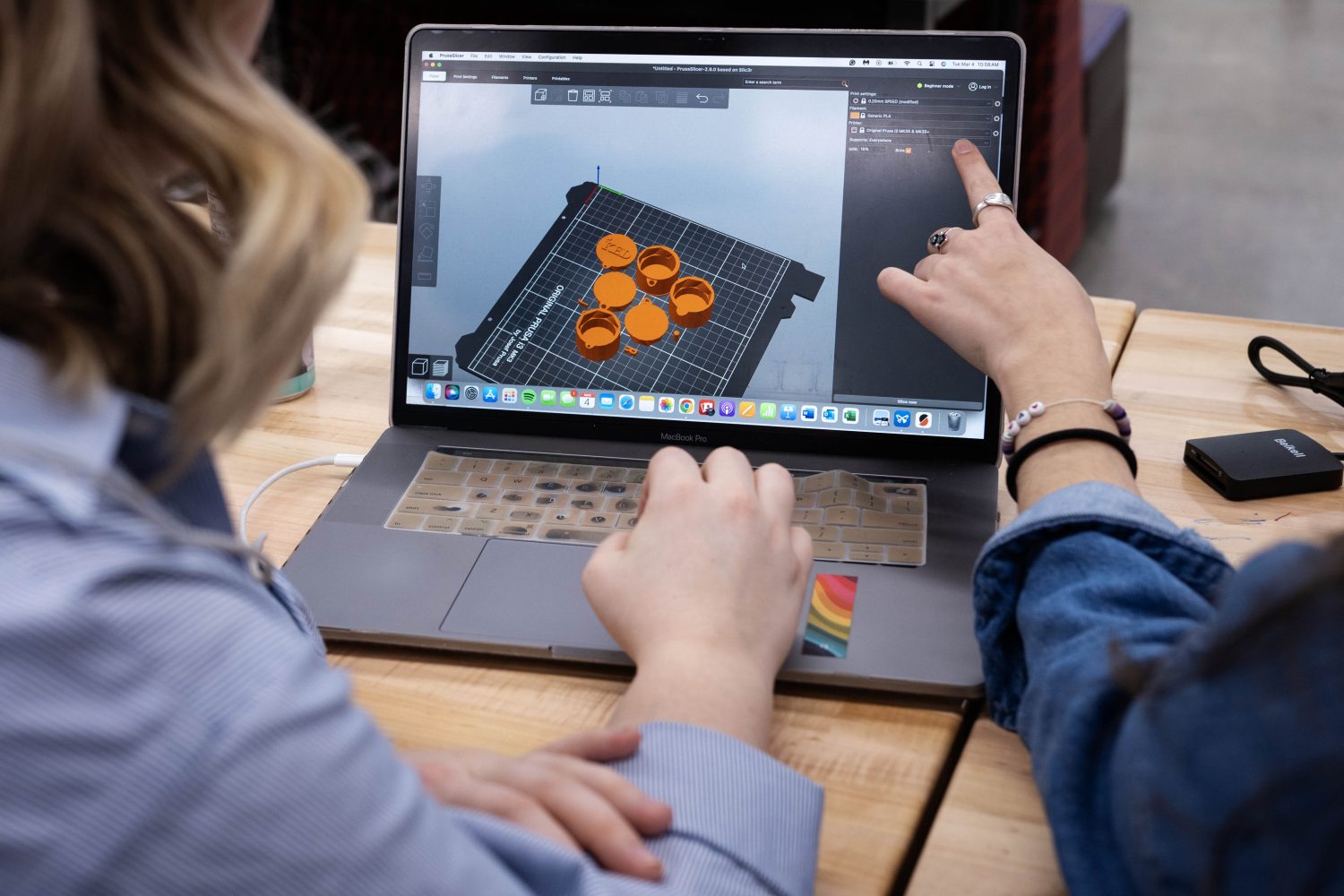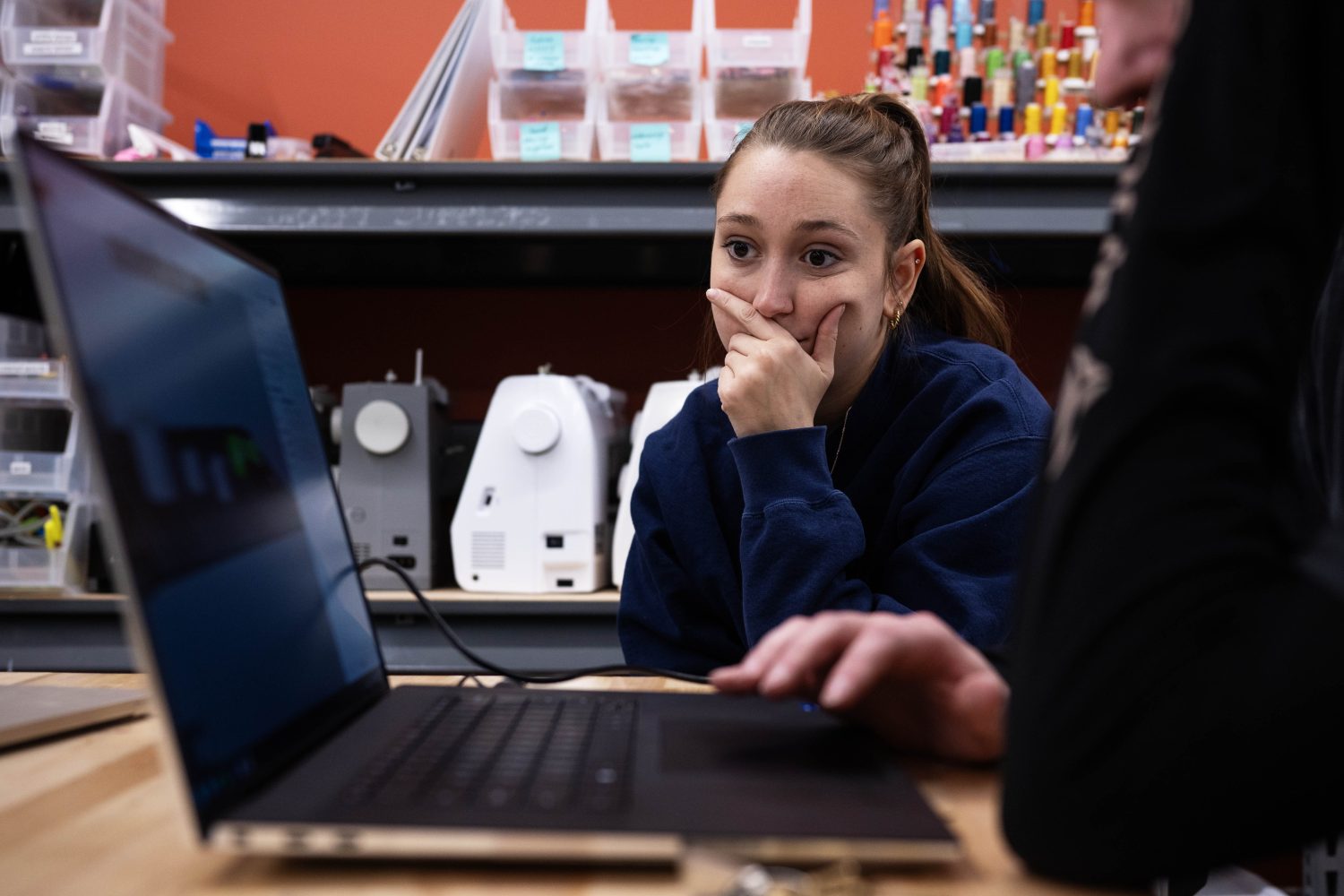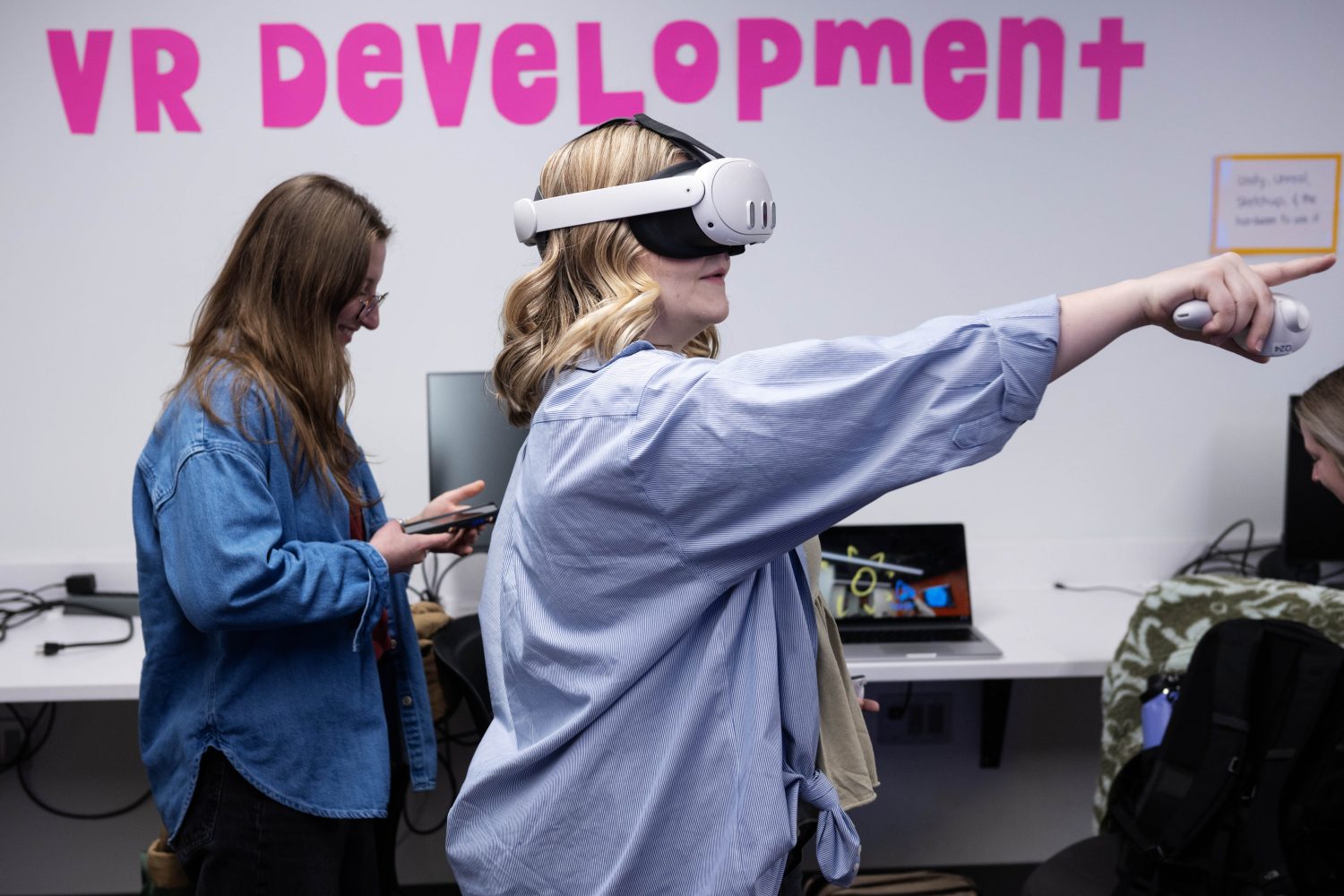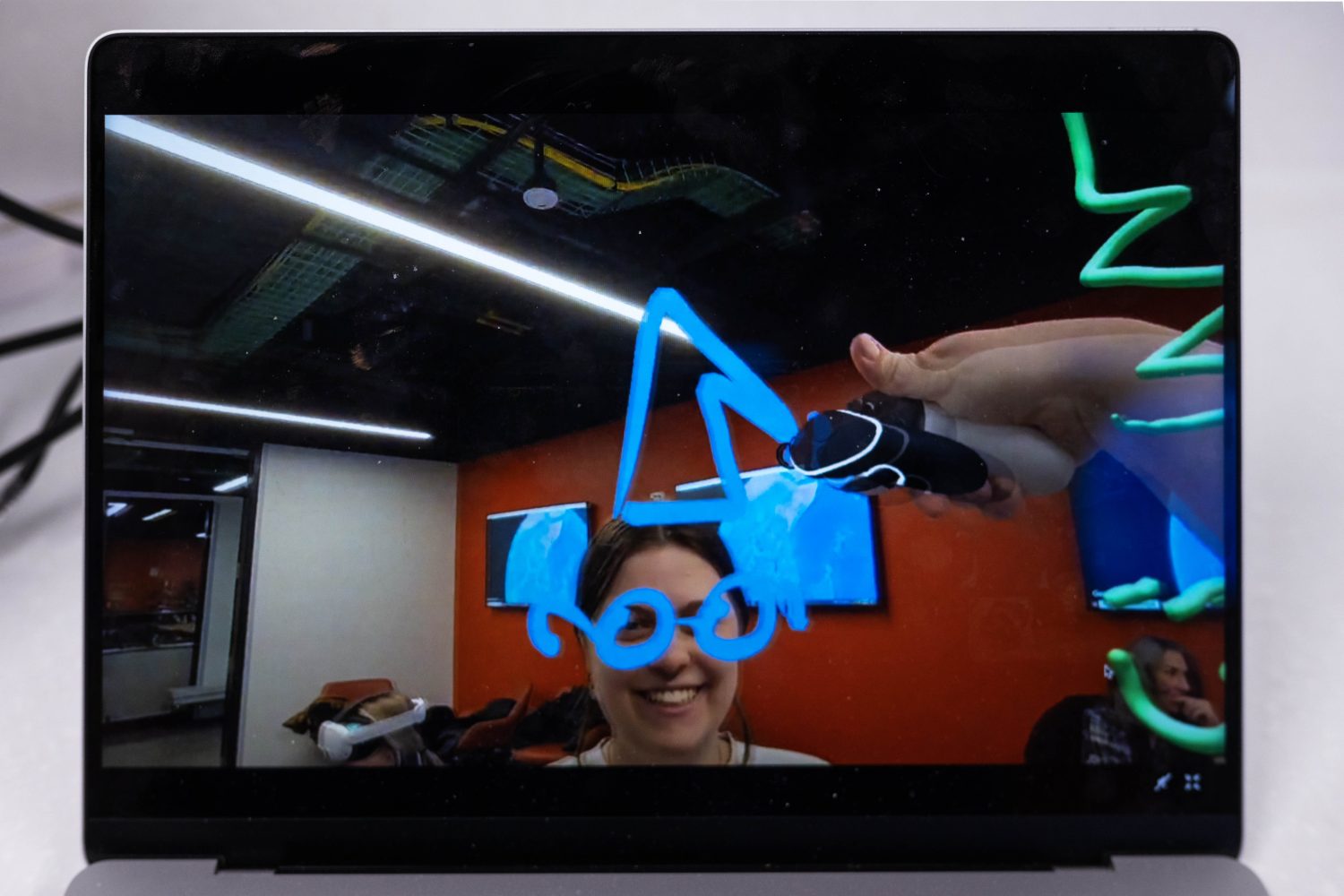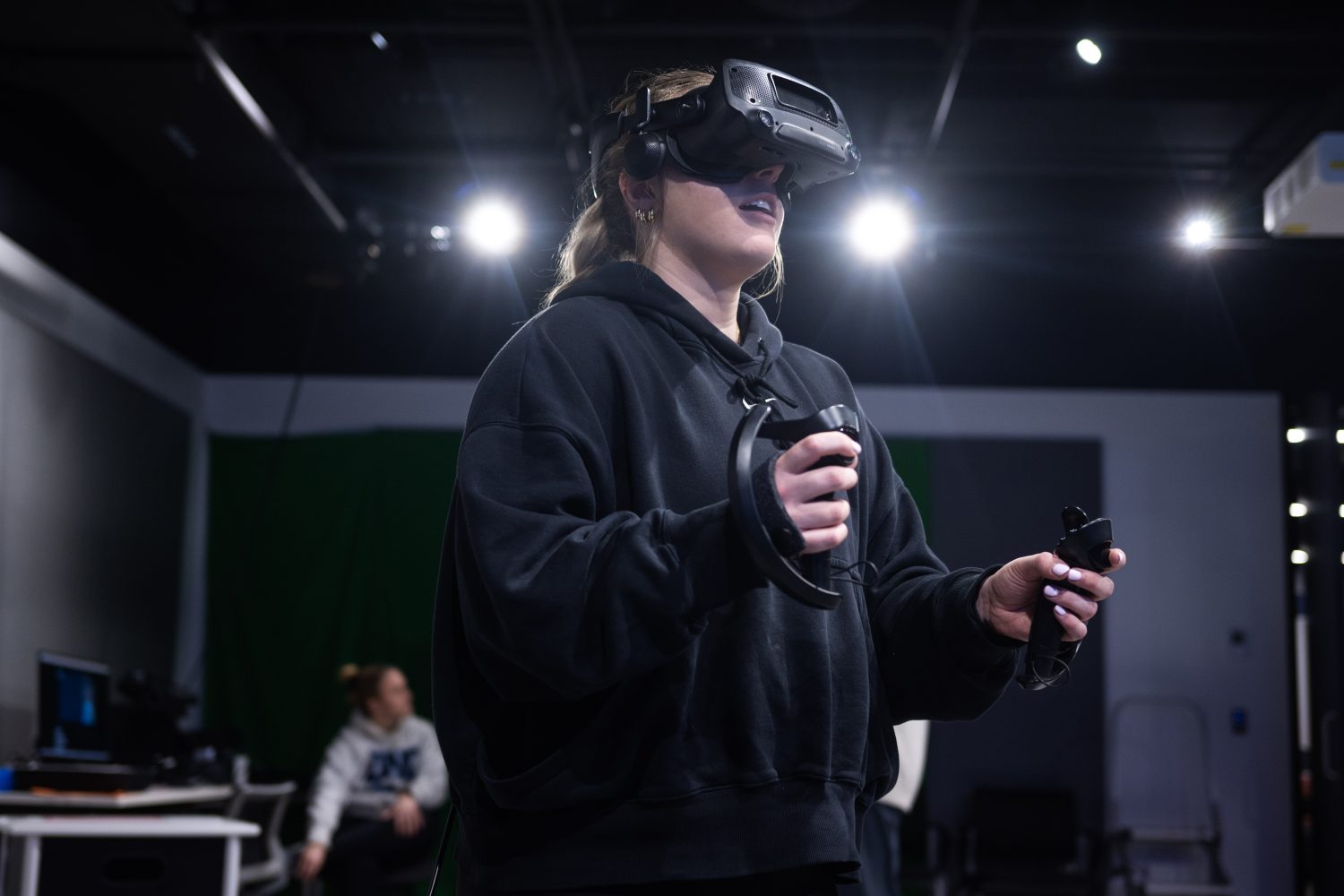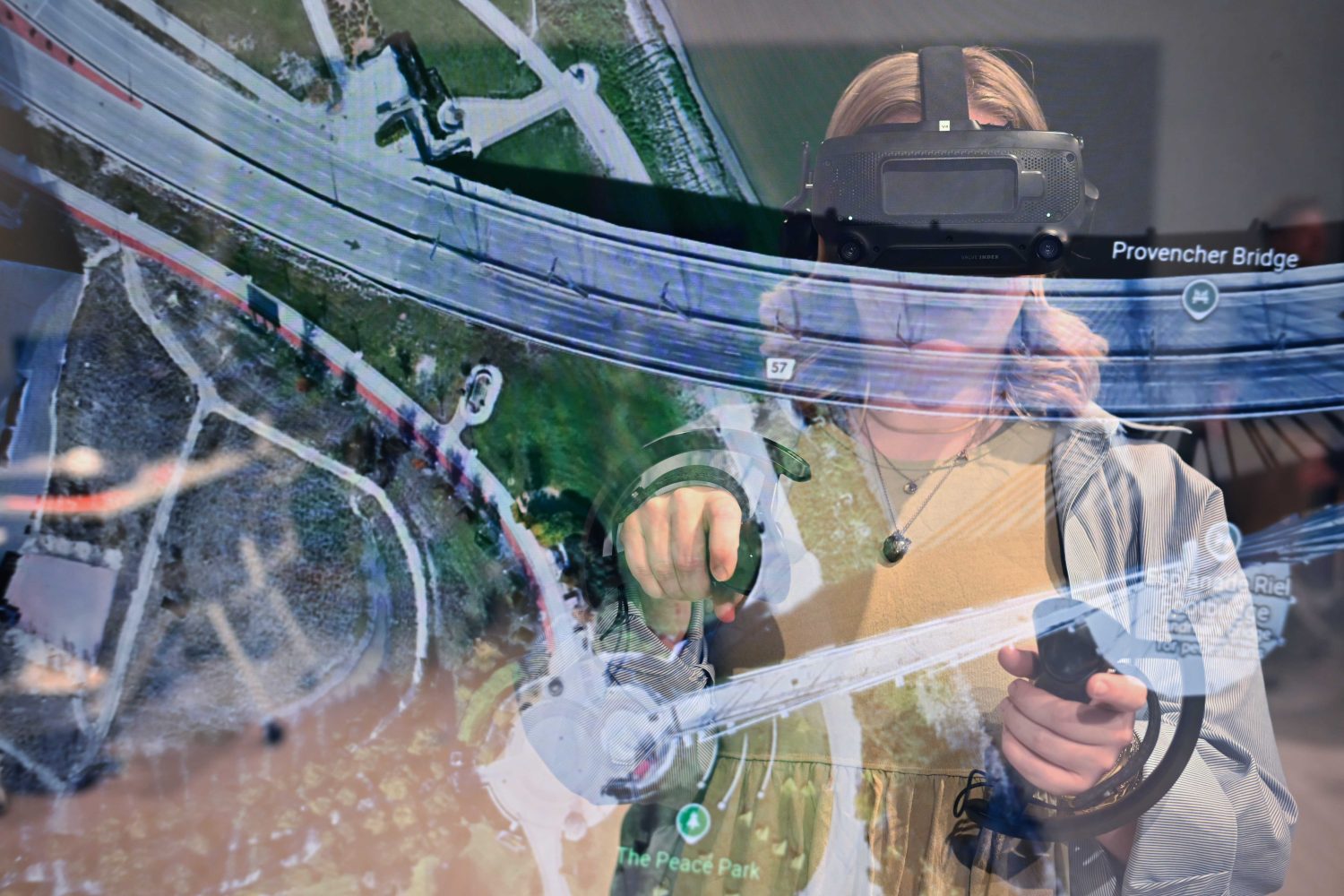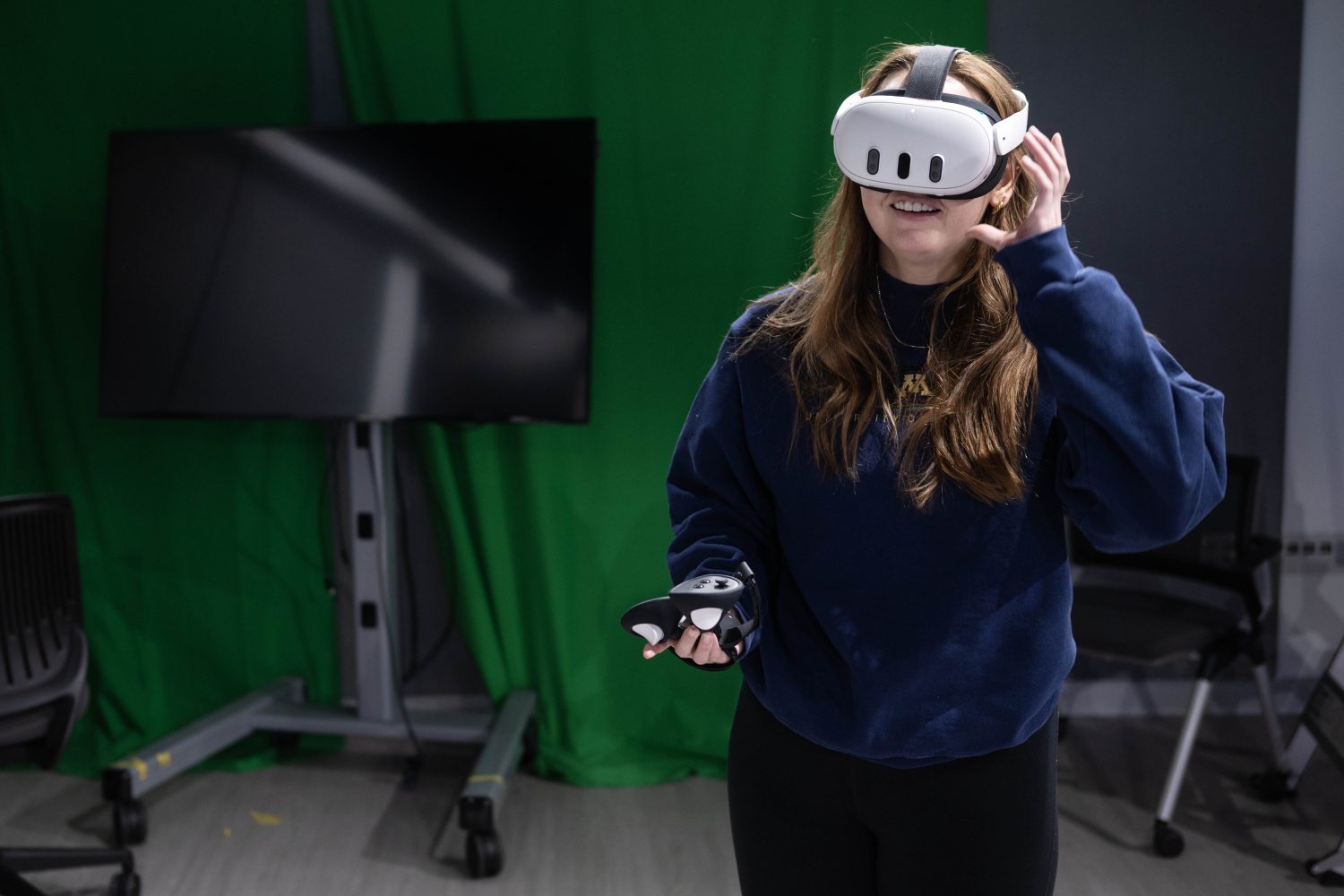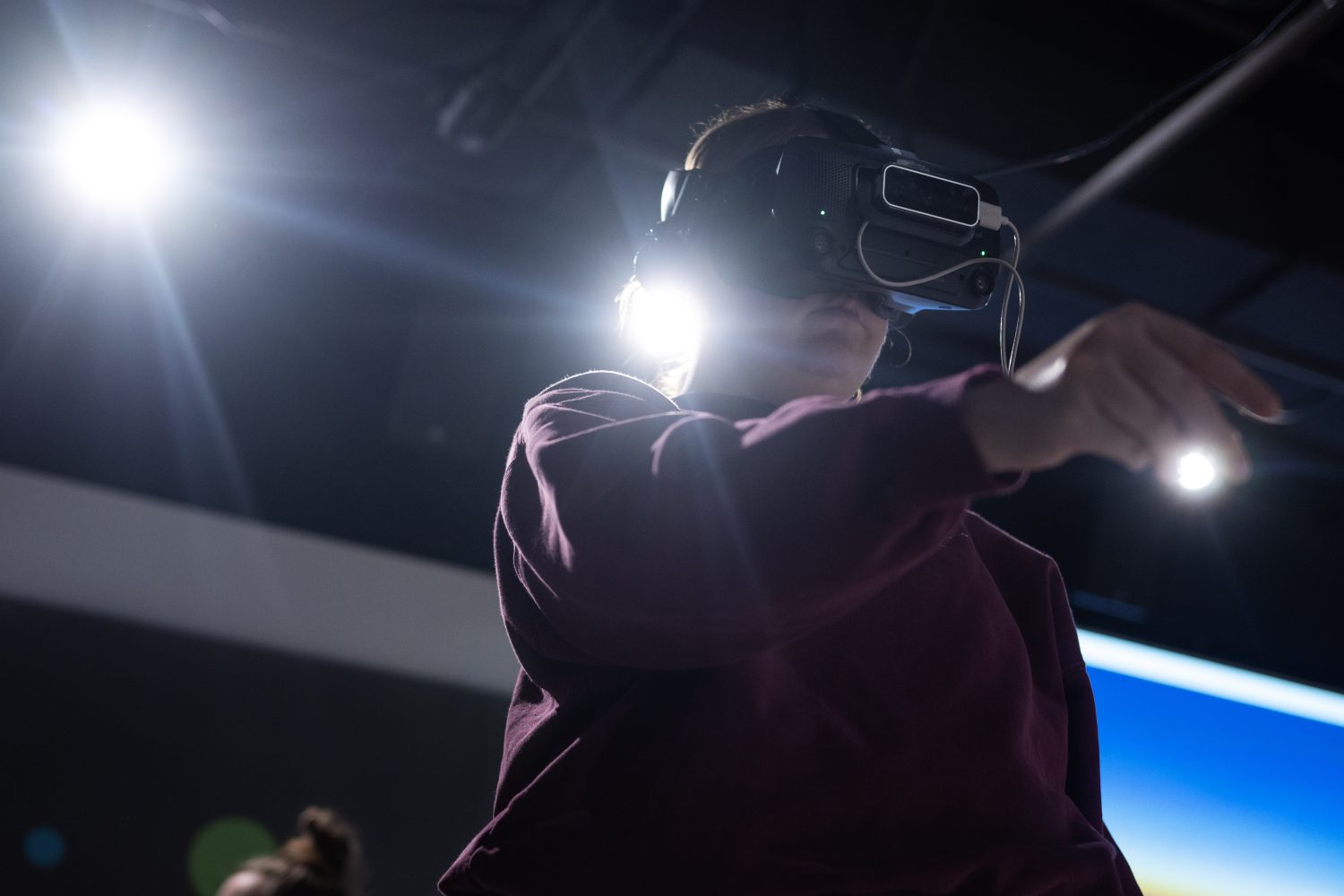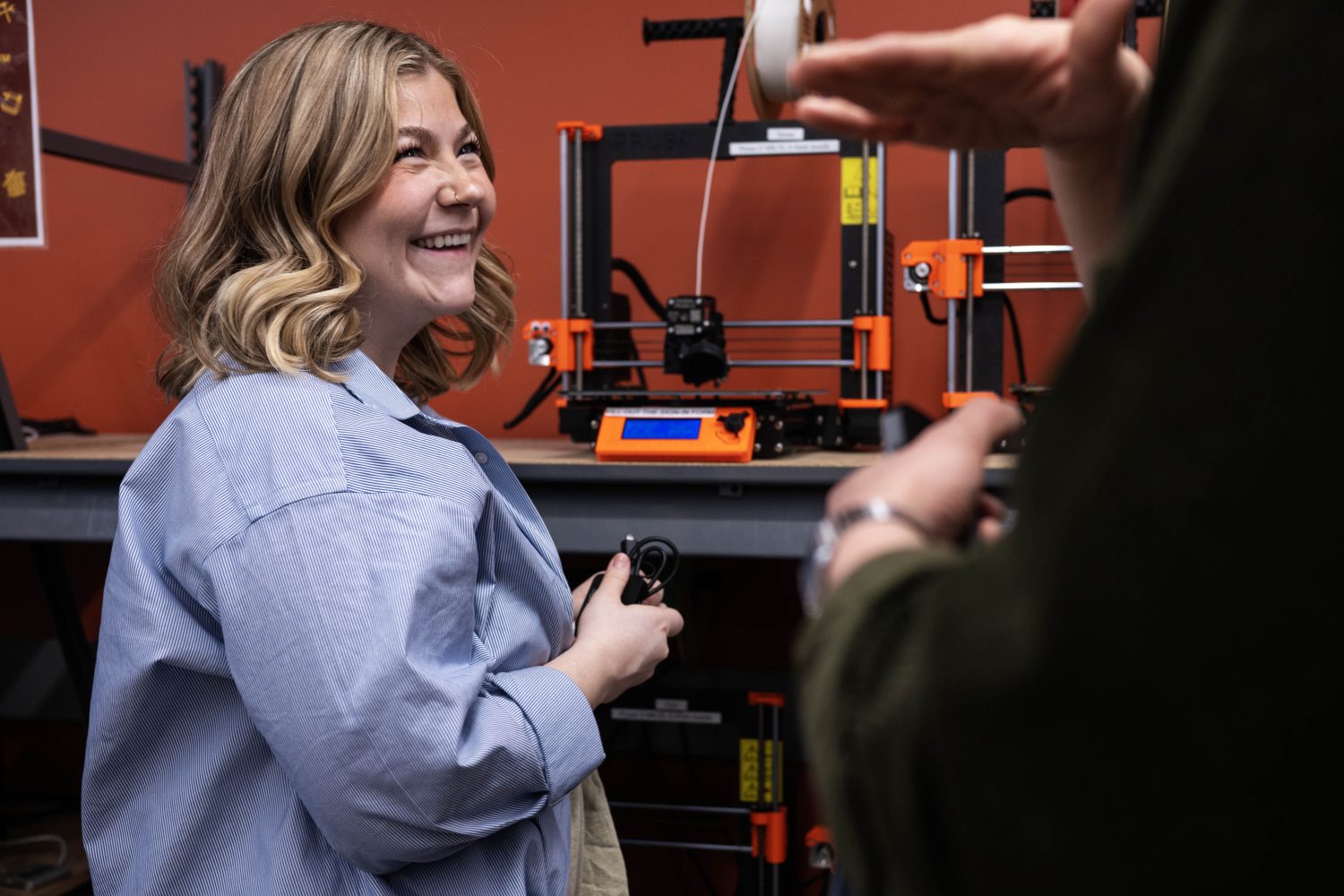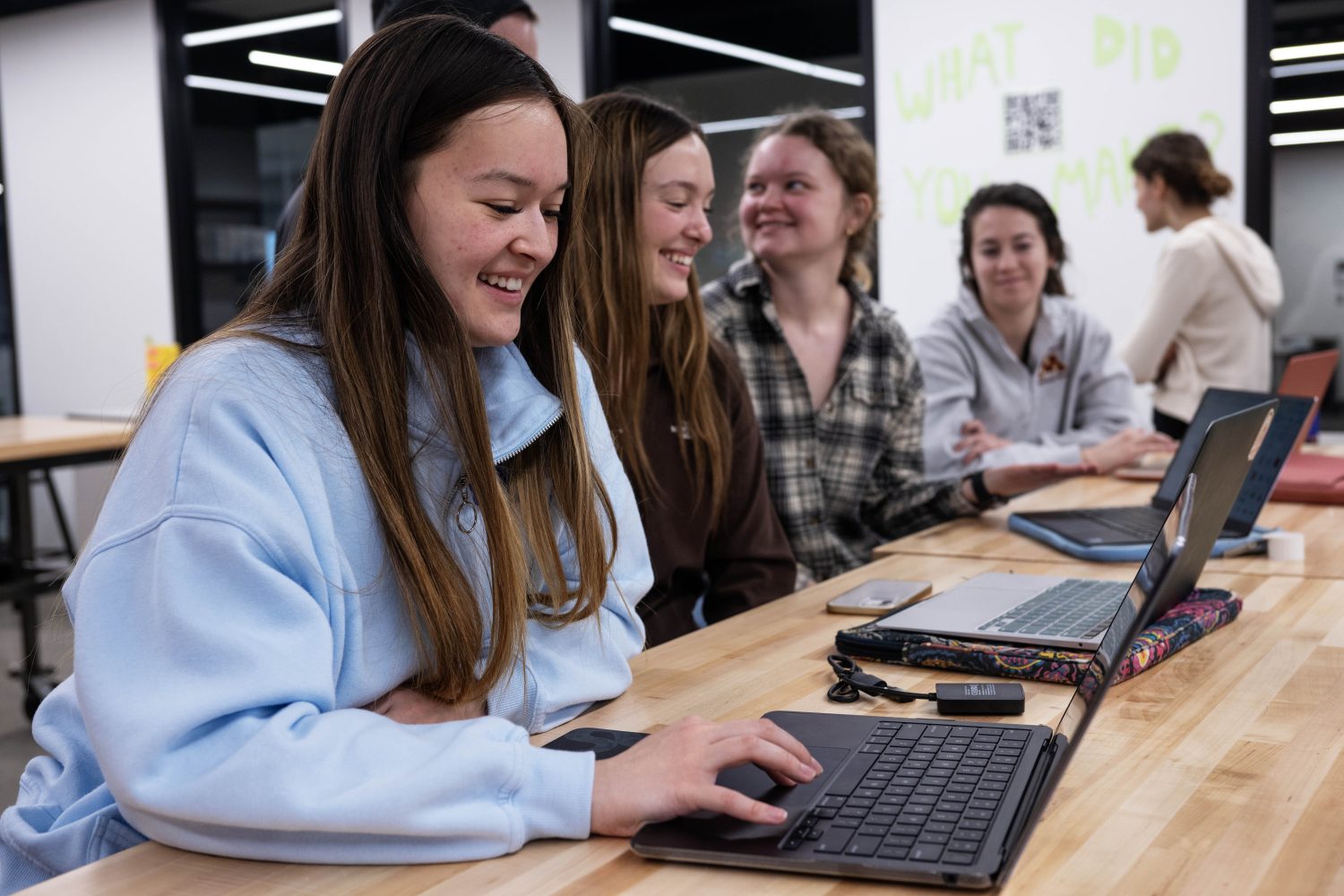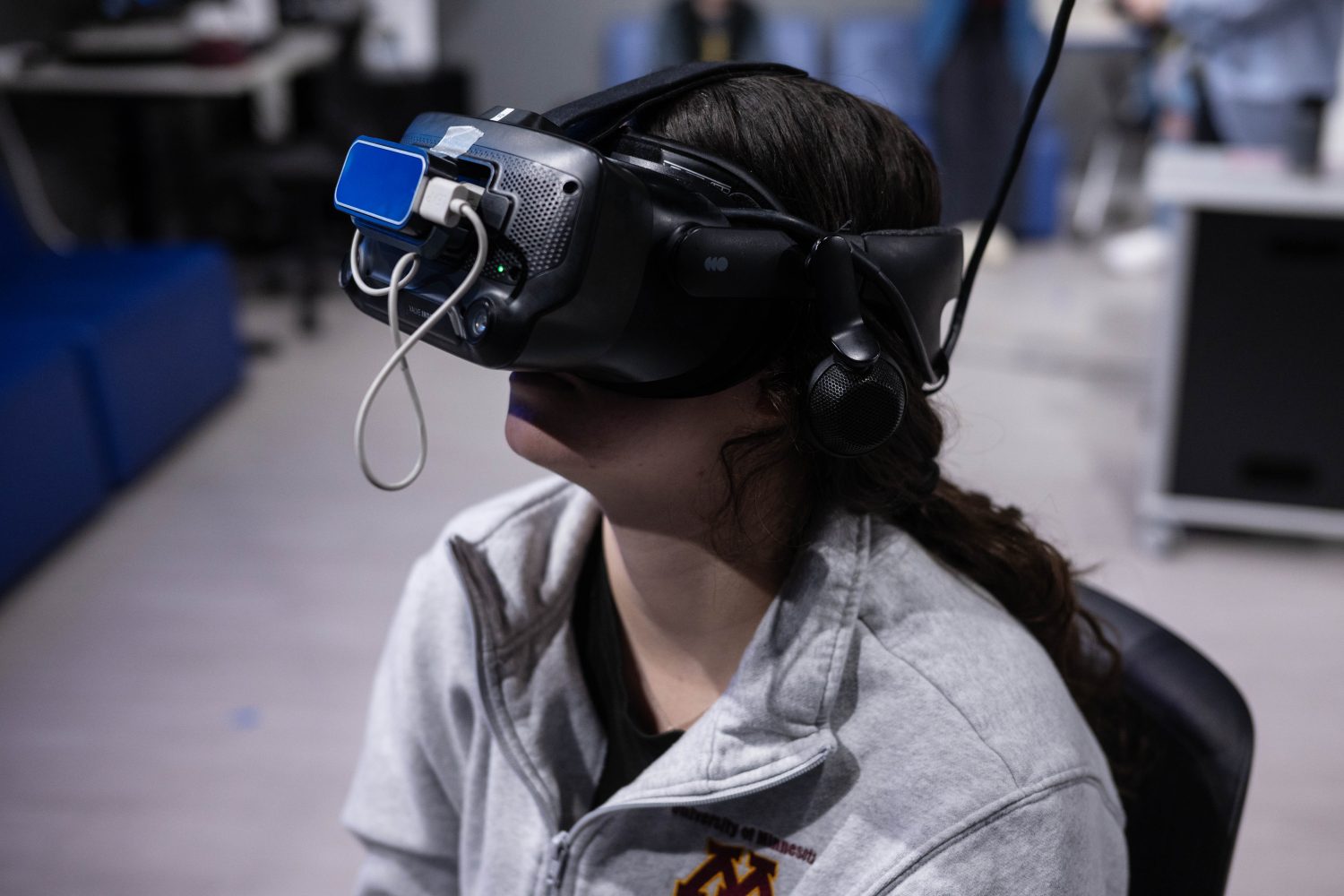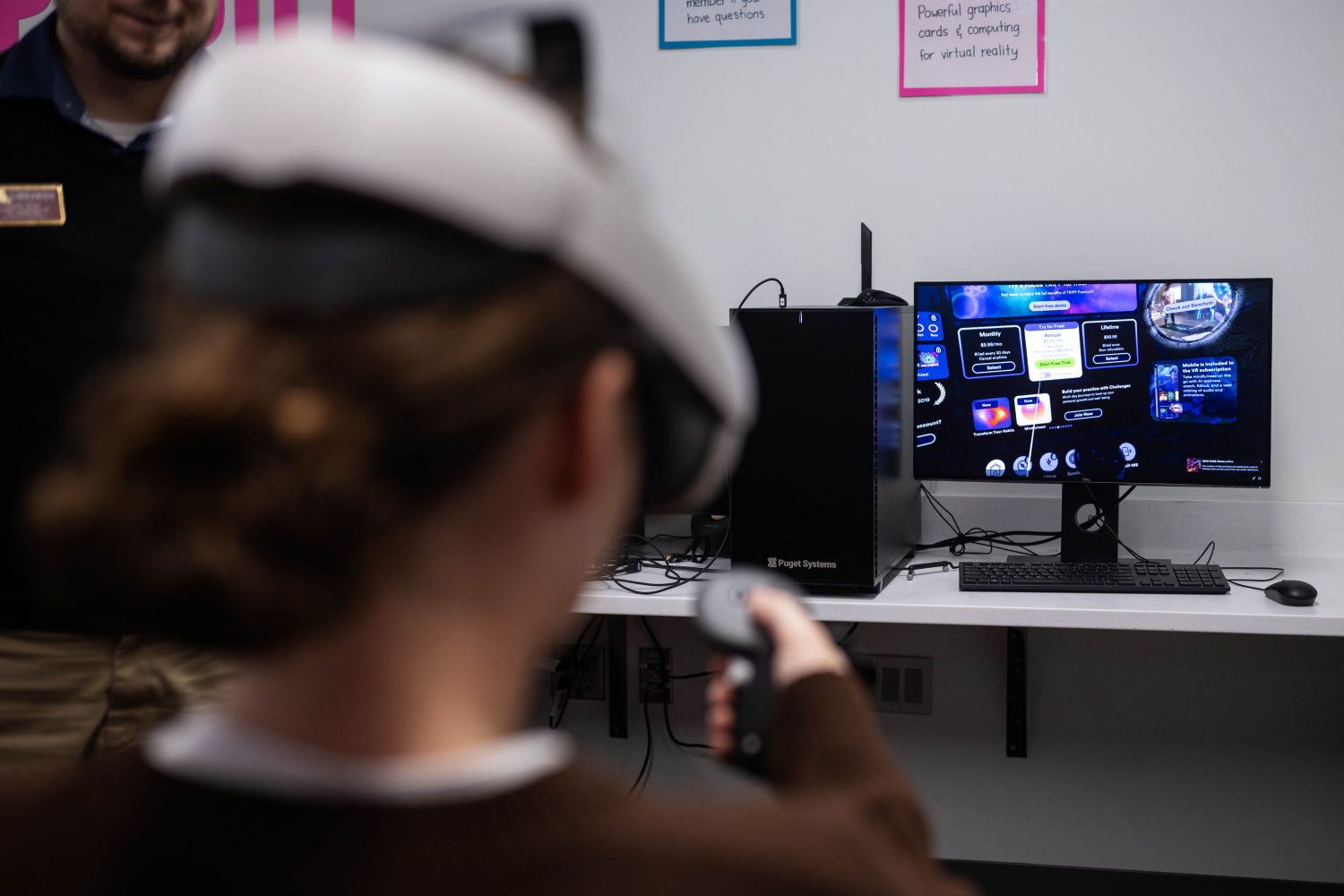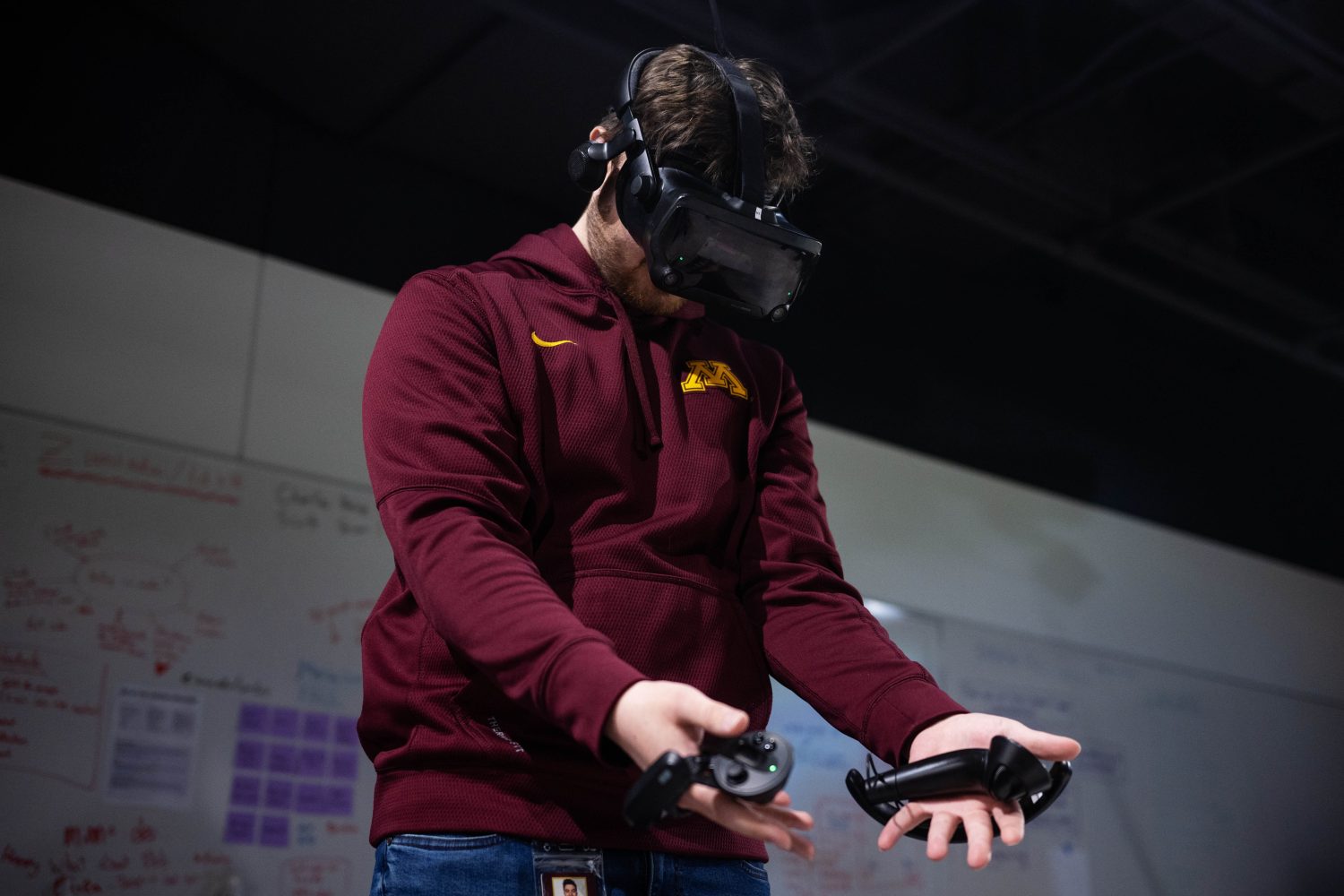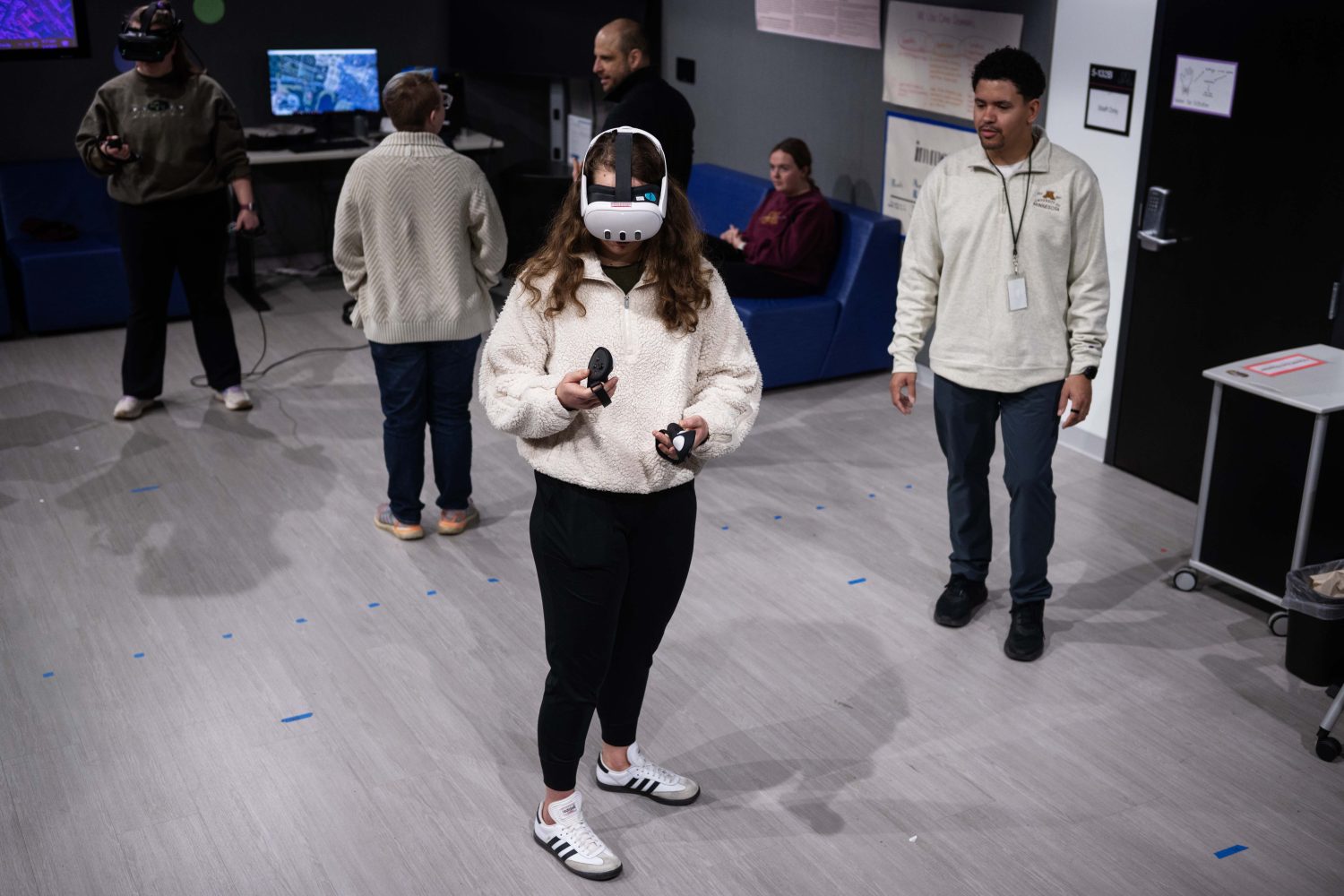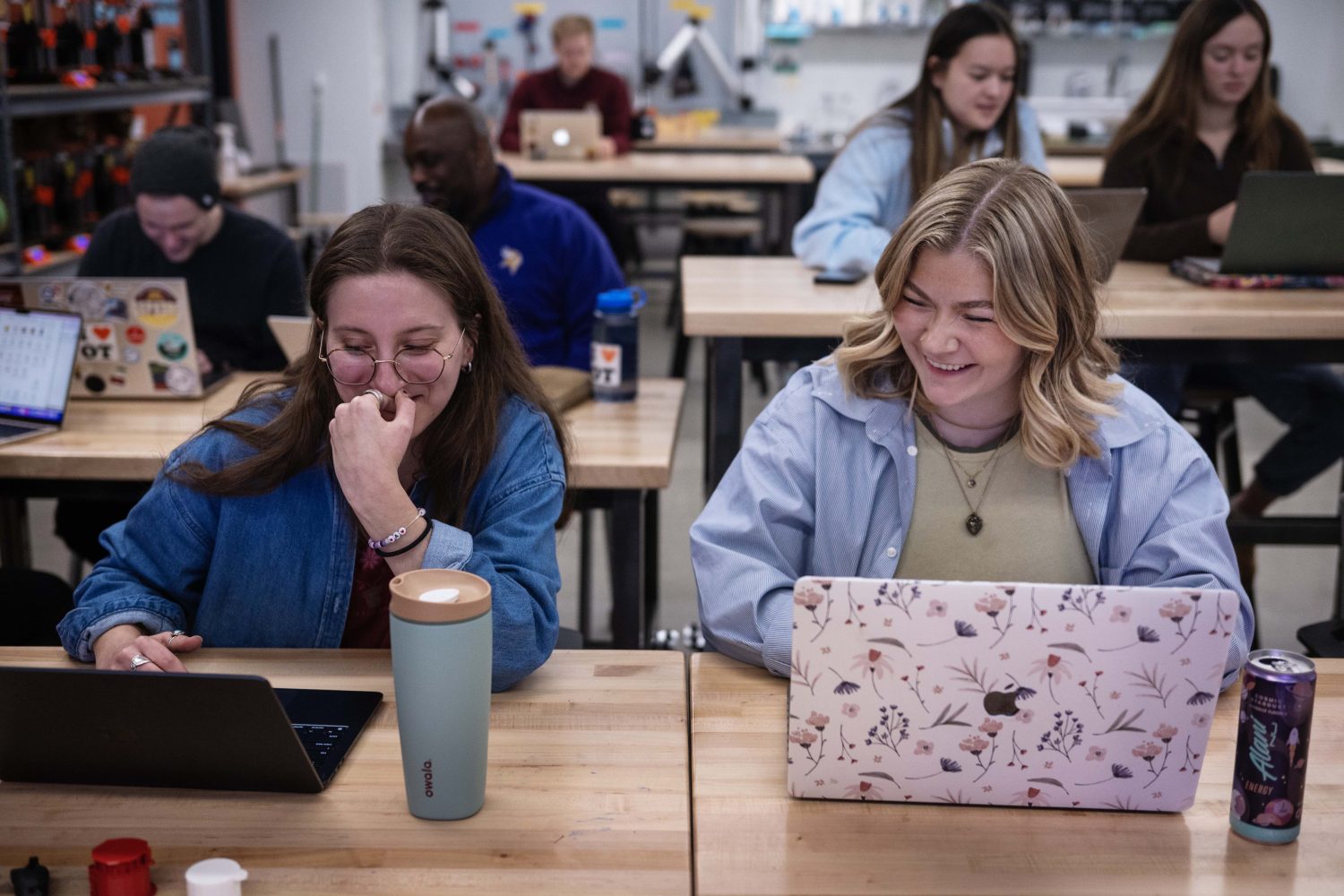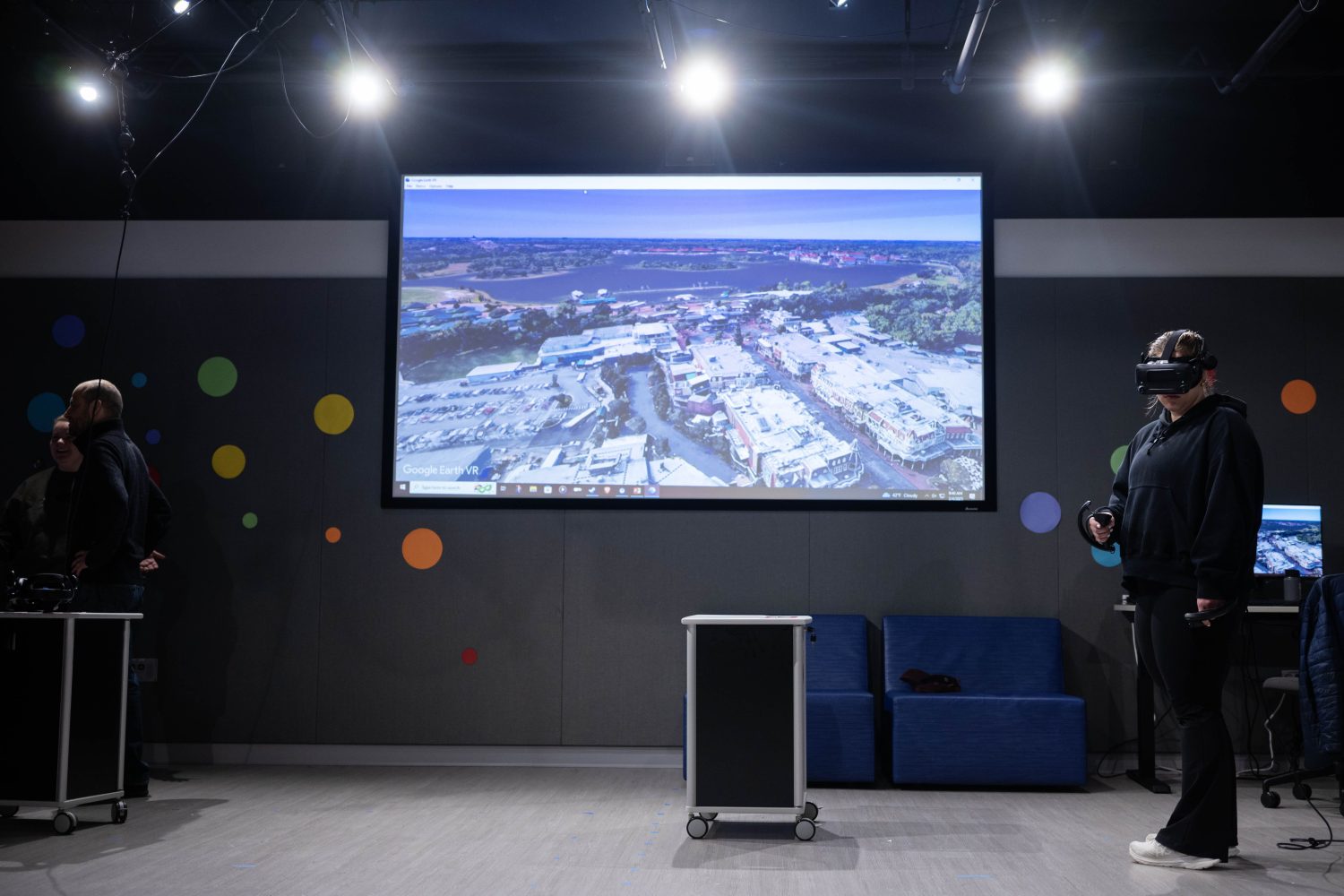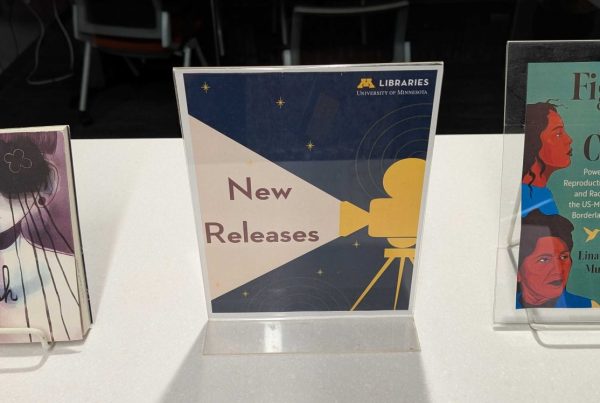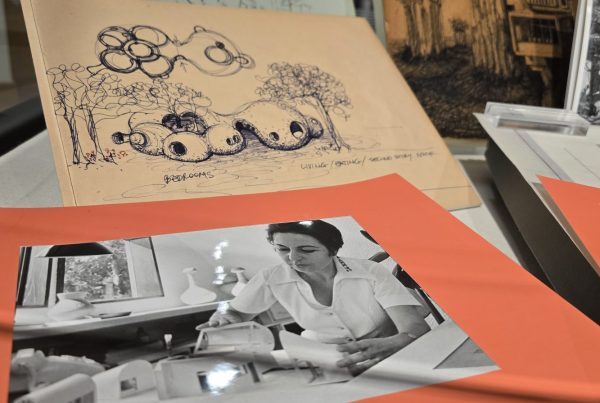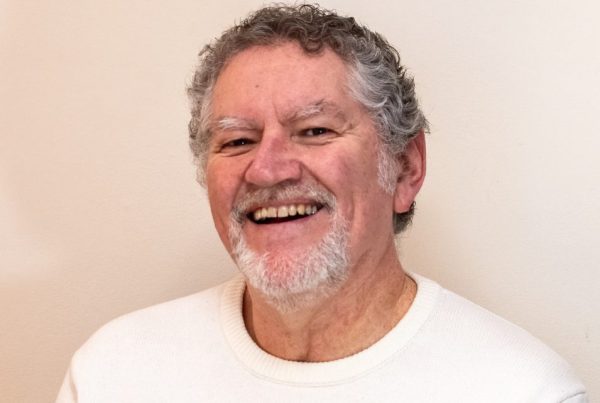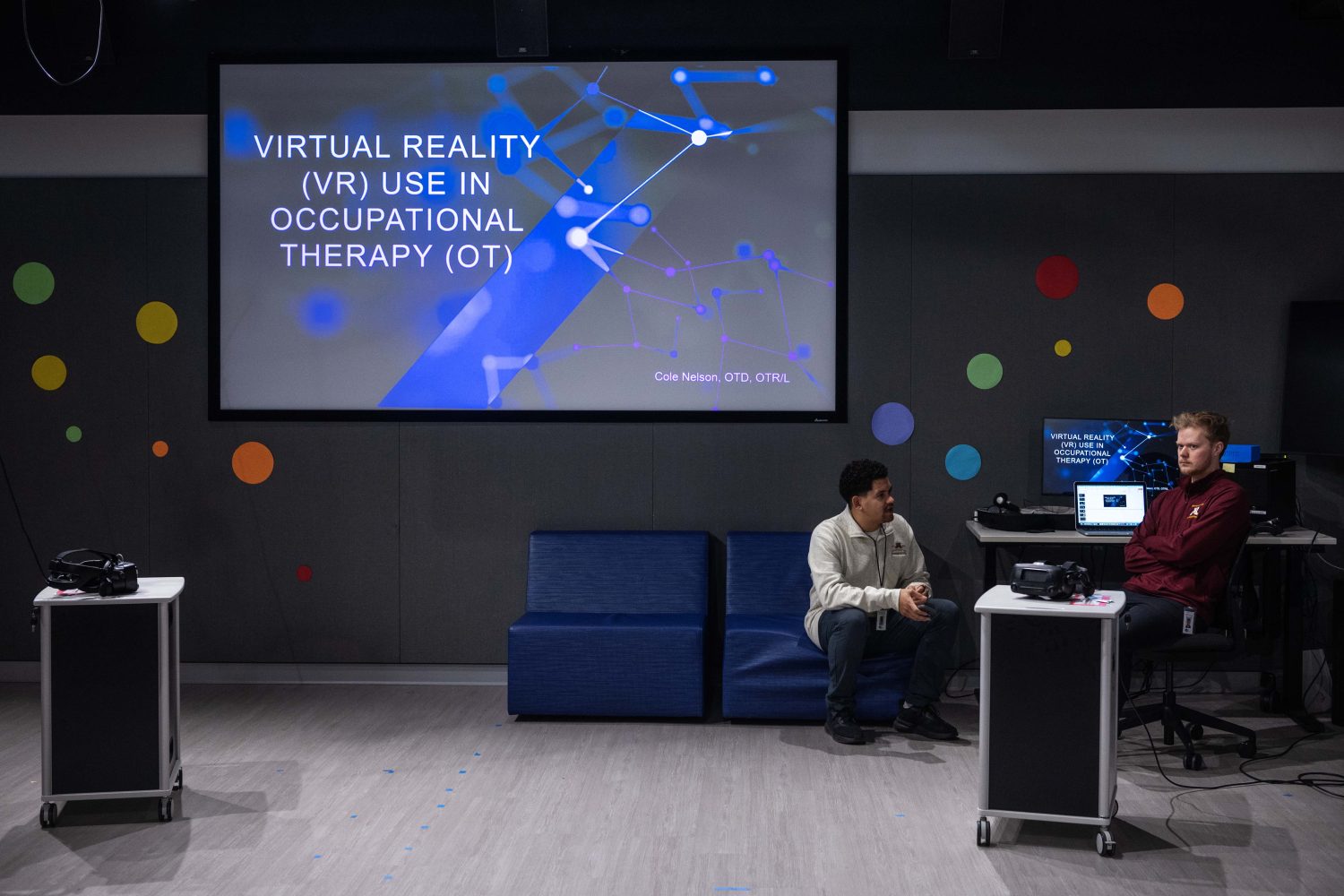
Isaiah Wills and Cole Nelson, instruction support staff, prepare for class in the Virtual Reality Studio on March 4, 2025. (Photo/Adria Carpenter)
Whether you’re recovering from an injury or surgery, or living with a chronic medical condition or disability, occupational therapists are there to help you perform your daily routine.
And now future occupational therapists at the University of Minnesota are examining how emerging technologies like virtual reality and 3D printing can help people overcome their individual challenges and regain their personal autonomy.
Cole Nelson is a licensed occupational therapist and instruction support staff for OT 7541, Assistive Technology and Orthotics in OT Practice. But not long ago, Nelson was a student in the University of Minnesota’s OT program.
“When we had this class I remember using the Virtual Reality Studio,” he said. “It was a big part of why I wanted to do my capstone in virtual reality, because I saw that there was so much opportunity.”
- Occupational therapy students play Beat Saber in the Virtual Reality Studio on March 4, 2025. (Photo/Adria Carpenter)
- Occupational therapy students visit the Virtual Reality Studio and Makerspace on March 4, 2025. (Photo/Adria Carpenter)
- Occupational therapy students visit the Virtual Reality Studio and Makerspace on March 4, 2025. (Photo/Adria Carpenter)
- Occupational therapy students visit the Virtual Reality Studio and Makerspace on March 4, 2025. (Photo/Adria Carpenter)
Even simple programs have hidden benefits. Beat Saber, a VR rhythm game, has players slice glowing blocks with lights sabers to the beat of energetic music. At the same time, it tests the players’ reflexes, hand-eye coordination, and balance, and enhances those skills in everyday life.
A program like Google Earth VR could help patients with mobility problems explore far-off or inaccessible places, help those in memory care recall places from their past, or help people familiarize themselves with routes to the doctor’s office or grocery store — while other programs could lead people through home and kitchen safety checks.
In the Makerspace, Lab Manager Steven Bleau taught OT students the fundamentals of 3D printing, showing them how to design and print low-cost, assistive tools. Students could then test and modify those tools to meet their patient’s individual needs, before they invested in expensive equipment.
- Makerspace Lab Manager Steven Bleau teaches students 3D design and prinitng, on March 4, 2025. (Photo/Adria Carpenter)
- Occupational therapy students visit the Virtual Reality Studio and Makerspace on March 4, 2025. (Photo/Adria Carpenter)
- Occupational therapy students visit the Virtual Reality Studio and Makerspace on March 4, 2025. (Photo/Adria Carpenter)
- Occupational therapy students visit the Virtual Reality Studio and Makerspace on March 4, 2025. (Photo/Adria Carpenter)
“It’s an awesome experience that’s available for the students, and that it’s good not only for other OT rehab programs but just the general University,” Nelson said. I think that would be wonderful for them.”
Korinn Delaney, a second-year doctoral student in the OT program from Stillwater, Minnesota, was initially drawn to occupation therapy because of its versatility, and she plans to use virtual reality and other emerging technologies in her clinical practice for the same reason.
“Occupational therapy didn’t feel like I was pigeonholing myself because there’s so much you can do with it,” Delaney said. “I didn’t know they had so many simulations that could be beneficial. It’s really stretching my mind. I have anxiety, and being in the meditation one was super helpful.”
- Korinn Delaney draws in virtual reality on March 4, 2025. (Photo/Adria Carpenter)
- Korinn Delaney draws in virtual reality on March 4, 2025. (Photo/Adria Carpenter)
- Occupational therapy students visit the Virtual Reality Studio and Makerspace on March 4, 2025. (Photo/Adria Carpenter)
- Korinn Delaney uses Google Earth VR on March 4, 2025. (Photo/Adria Carpenter)
Nelson has been helping with the course since spring of 2024, though this year he’s joined by Isaiah Wills, another licensed occupational therapist who works in the setting of assisted technology.
The two are able to bring real-life examples from their experiences in the community into the classroom. And with VR Program Lead Charlie Heinz, Media Outreach Librarian Scott Spicer, and Makerspace Lab Manager Steven Bleau, they’re able to refine educational activities and show students the future of these technologies.
“Charlie and Scott and the rest of their team have been extremely helpful. I wouldn’t be able to run this lab without their help, and Steven over in the Makerspace as well,” Nelson said. “They’re just very knowledgeable of where the technology is at right now, where it’s going, and how to lead that tech along the way. They’ve been extremely helpful for the past year that I’ve helped out with this class.”
“The last two days, I’ve learned so much more that I didn’t even really consider,” Wills added. “It’s something I wish I had in my OT program, and I can’t wait to come back.”
- Occupational therapy students visit the Virtual Reality Studio and Makerspace on March 4, 2025. (Photo/Adria Carpenter)
- Occupational therapy students visit the Virtual Reality Studio and Makerspace on March 4, 2025. (Photo/Adria Carpenter)
- Korinn Delaney learns the basics of 3D design and printing in the Makerspace on March 4, 2025. (Photo/Adria Carpenter)
- Occupational therapy students visit the Virtual Reality Studio and Makerspace on March 4, 2025. (Photo/Adria Carpenter)
- Occupational therapy students visit the Virtual Reality Studio and Makerspace on March 4, 2025. (Photo/Adria Carpenter)
- Occupational therapy students visit the Virtual Reality Studio and Makerspace on March 4, 2025. (Photo/Adria Carpenter)
- Occupational therapy students visit the Virtual Reality Studio and Makerspace on March 4, 2025. (Photo/Adria Carpenter)
- Occupational therapy students visit the Virtual Reality Studio and Makerspace on March 4, 2025. (Photo/Adria Carpenter)
- Korinn Delaney (right) learns the basics of 3D design and printing in the Makerspace on March 4, 2025. (Photo/Adria Carpenter)
- Occupational therapy students visit the Virtual Reality Studio and Makerspace on March 4, 2025. (Photo/Adria Carpenter)


